5 Best Notion Alternatives for 2025
Best Notion Alternatives
10th Jan, 2025
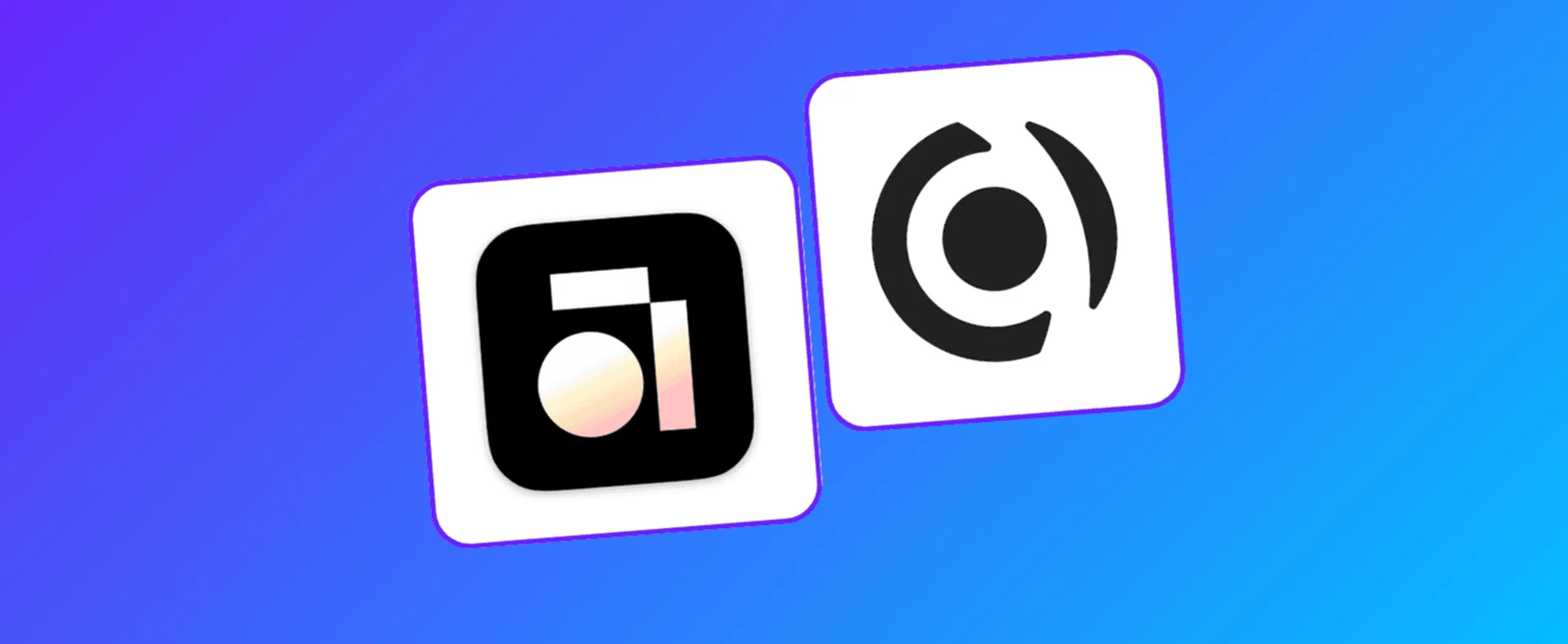
Looking for an alternative to Notion? We have gathered 12 of the best Notion alternatives for handling notes, databases, projects, collaborative work and much more. Check out our list for teams and personal use to find a new Notion.
Notion is one of the most powerful tools in the productivity space right now, primarily due to its database capabilities. Many people regard the database as one of the most effective ways to customize and build a personal workspace. This experience is increasingly beneficial, not just for individuals but also for teams seeking to design their desired workspace.
With Notion’s improvement in automation and integration, it is becoming a valuable platform for managing a customized workspace. Let’s explore some alternatives to Notion. However, for some users, Notion may feel overwhelming, and they might prefer a more approachable alternative. Let’s examine those options.
Why are people moving from Notion?
Many of the Notion alternatives that we have picked in this article help you to address some of the issues surrounding Notion’s offline modes, lack of security compared to other tools, and the learning curve that Notion typically brings because it’s quite a large experience.
A lot of people struggle with getting started and unpacking it for daily use. So, we’re going to address not just some busy professional alternatives to Notion, but also some team alternatives that can help you to better manage your daily routine using a planner-type experience like Notion.
Best Notion Alternatives
Here are the best Notion replacements in 2025:
1. xTiles
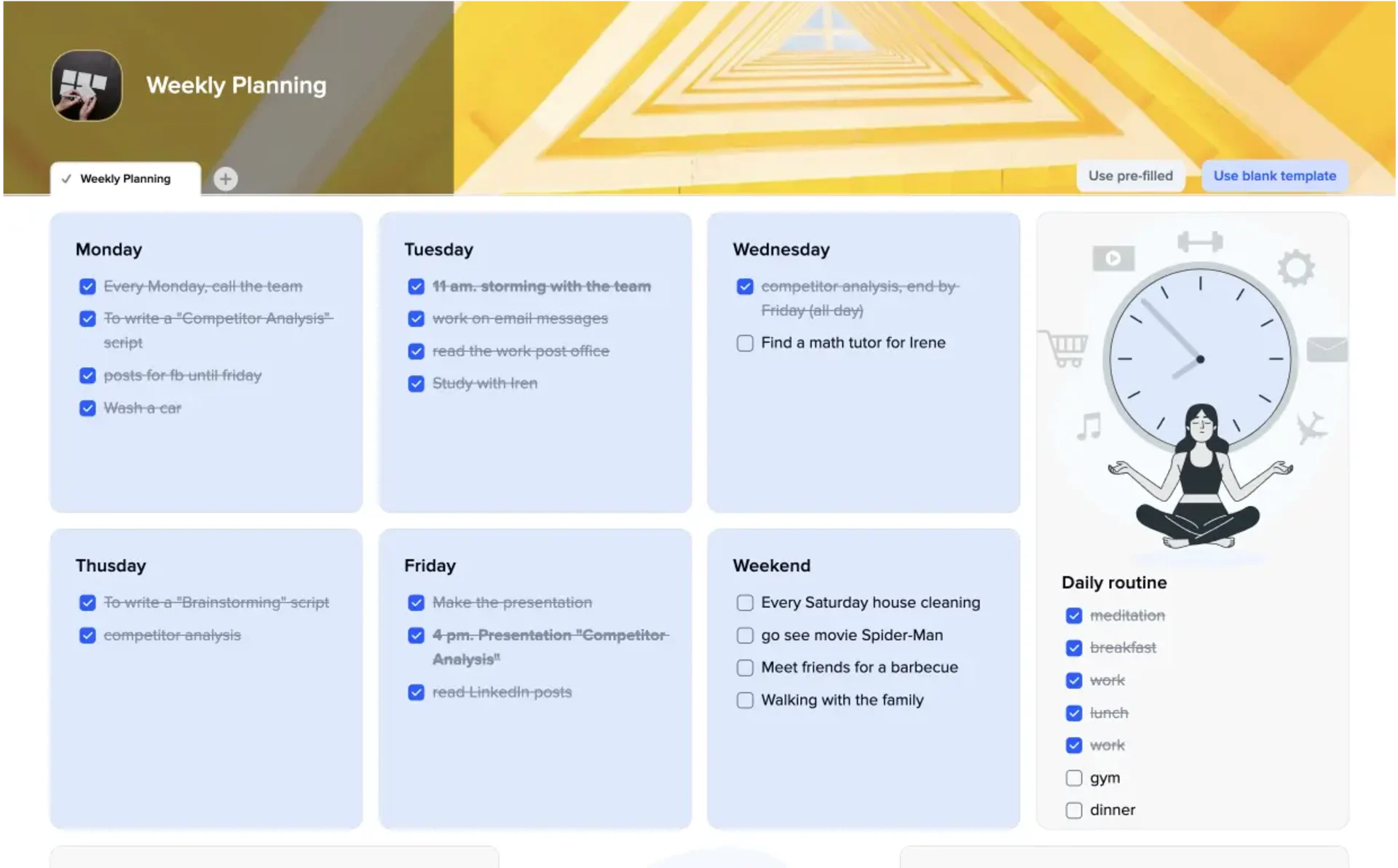
xTiles is an interesting alternative to Notion as it looks very similar but also gives you the structure you need to organize your workspace more effectively. The application provides a powerful way to build a workspace around daily planning, allowing you to add tasks, images, notes, and more, as well as use lightweight database capabilities when compared to Notion.
Overall, xTiles is probably more suitable for those looking for something more structured that combines elements of apps like Trello and Miro. The application is user-friendly and is favored by many people who want customization with a bit of an outline, rather than the total flexibility and customization that Notion offers.
2. Anytype
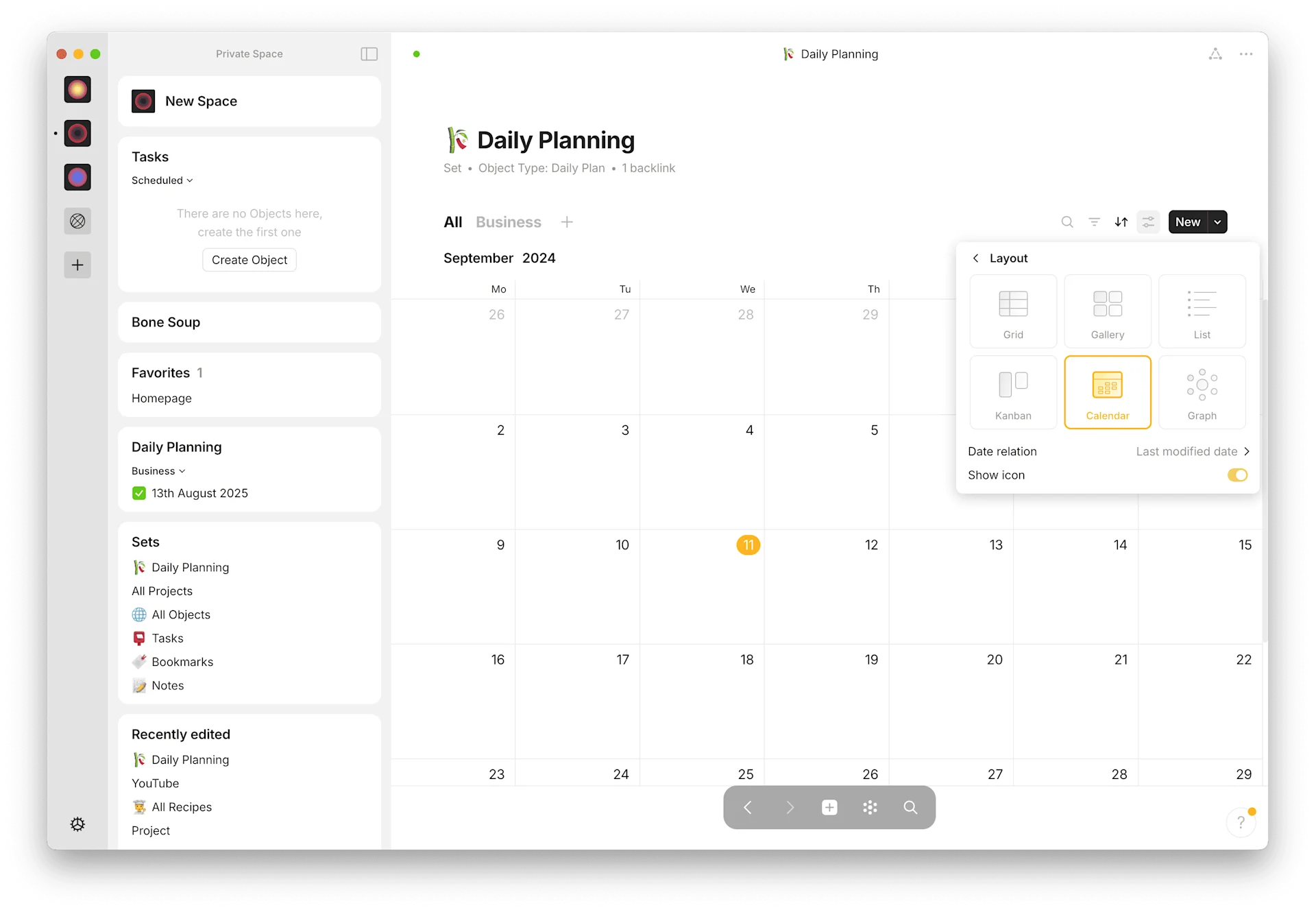
Anytype is a note-taking application with some interesting capabilities. Within Anytype, much like Notion, you can create databases that can help you organize notes or documents into different views like graphs, calendars, or galleries; many people see this as a Notion-like feature that can relate to, although it isn't better than Notion here.
Anytype also differs from Notion in that it focuses on privacy and security; at the same time, Notion has things in place. Anytype has this as one of its core values, with a local-first setup meaning that you can store everything locally on a device and use secure networks once you want it synced online. Many people find this more attractive than Notion's primary offering. However, it also shares a pain point with Notion: the lack of an official offline mode.
Pros:
- Open-source note-taking
- Local-first and peer-to-peer networking
- Works with markdown and native on desktop
- It comes with sets and collections for set-ups
- Good-rated iOS, and Android on respective App Stores
- Privacy-focused notes with E2E secure notes
- Good community and audience
Cons:
- It can be overwhelming to use
- Limited database abilities compared to Notion
- Still developing features
3. Capacities
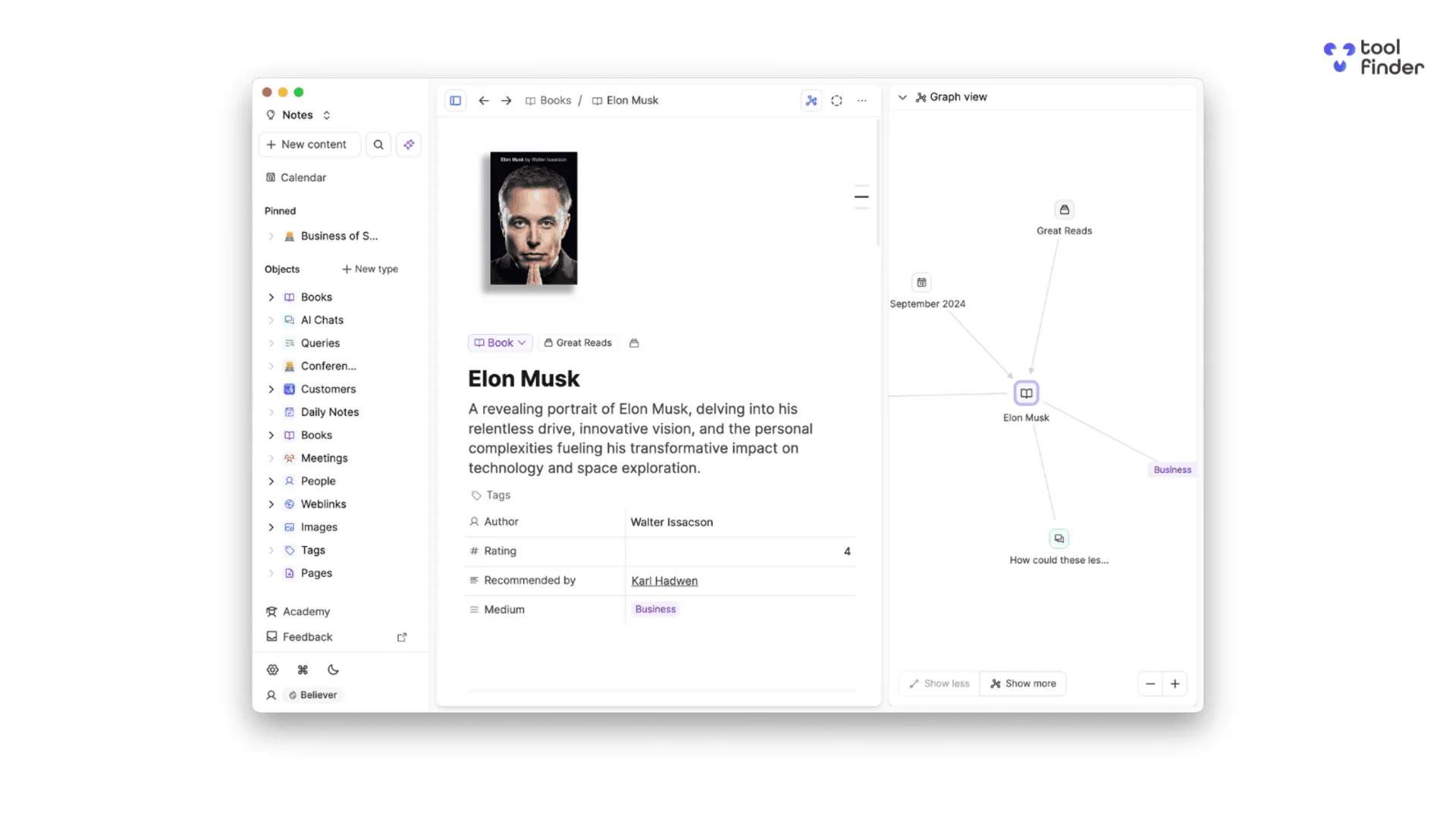
As a Notion alternative, Capacities has the design down to a close replica. Capacities make an attractive option for those looking for that clean design that Notion offers. They are also prevalent in apps like Anytype, which want to give the user a minimal yet functional feel by creating blocks.
Much like Anytype, Capacities offers objects to create notes with. If you're looking to replace Notion with Capacities purely on databases, you might be disappointed. Much like Anytype, they provide the user with the basics, but nothing like you see in Notion. Capacities is much more of a comprehensive note-taking tool that has PKM feature than it is a Notion full replacement; if you don't use database bases much but rely on notes and daily notes and want to have the same feel, then Notion will be more suited to you.
Pros:
- Beautiful Notion-like design
- It comes with a calendar mode for daily notes
- Works well offline with near offline functionality
- Comes with AI features for chatting with notes
- Easy to use once you get started
Cons:
- Lacks powerful databases
- It can be complicated for the average note-taker
Pricing:
Capacities are free to use, with a $9.99 per-month upgrade needed to access premium abilities.
4. Craft
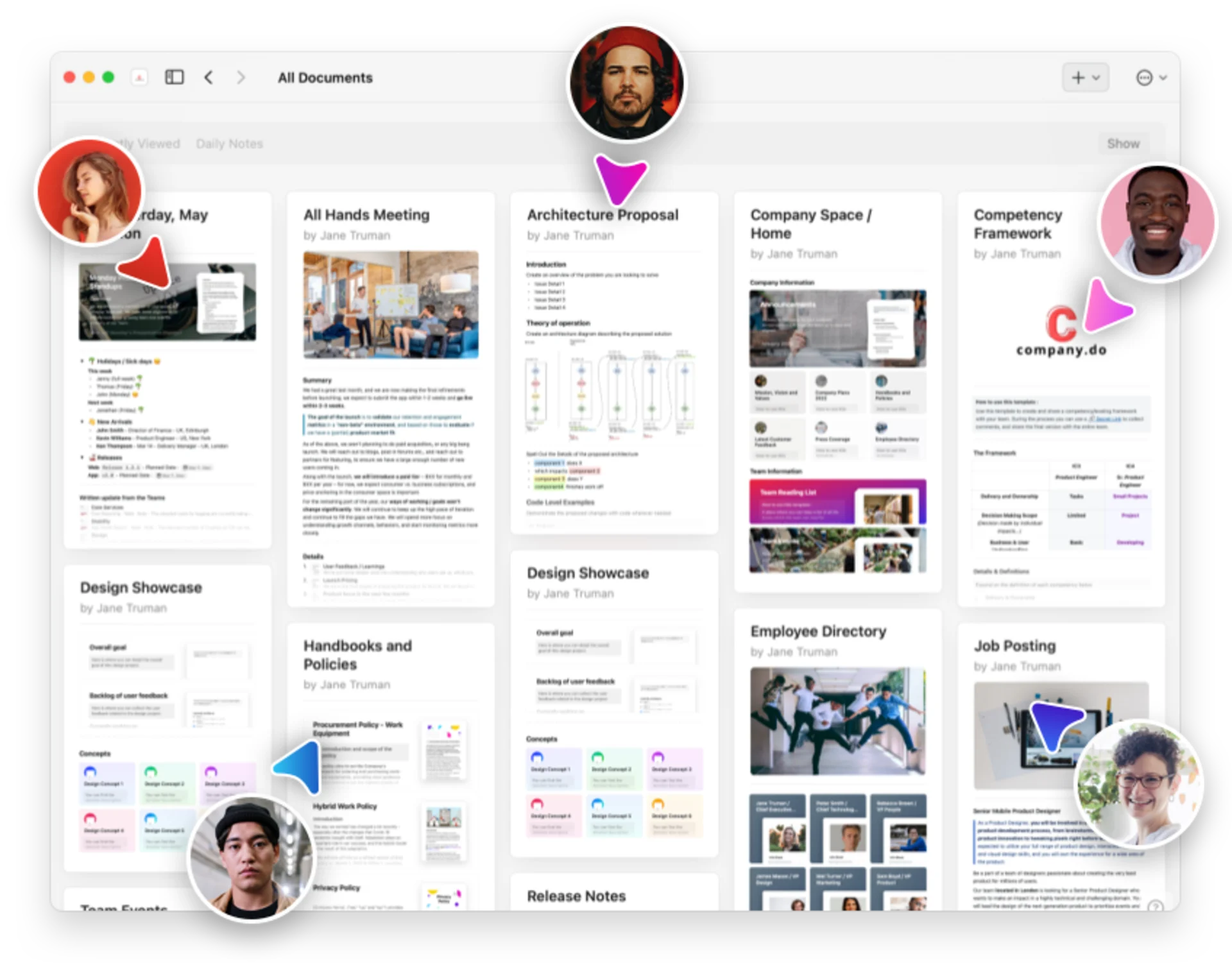
Craft is a document-style software that probably combats Notion the most on many fronts. With a similar design, great document features, and speedy, native apps, Craft makes for a compelling alternative for teams looking for something that doesn't focus too much on database management and has otherworldly features.
Craft best matches to you or your team if documents are the heart of your system. Think of Craft as Google Documents on steroids. It can replace Notion, but if you are an individual looking for something more traditional in structure and layout than Notion's open-plan canvas, which many people find difficult to manage and navigate, Craft is the solution for you.
Pros
- Craft is easy to use
- The apps are very fast & easy on iOS & macOS
- Great for individuals and teams alike
- Perfect for creating beautiful documents
- Does come with basic databases
Cons
- Doesn't come for Android
- Limited database abilities
5. AFFiNE Pro
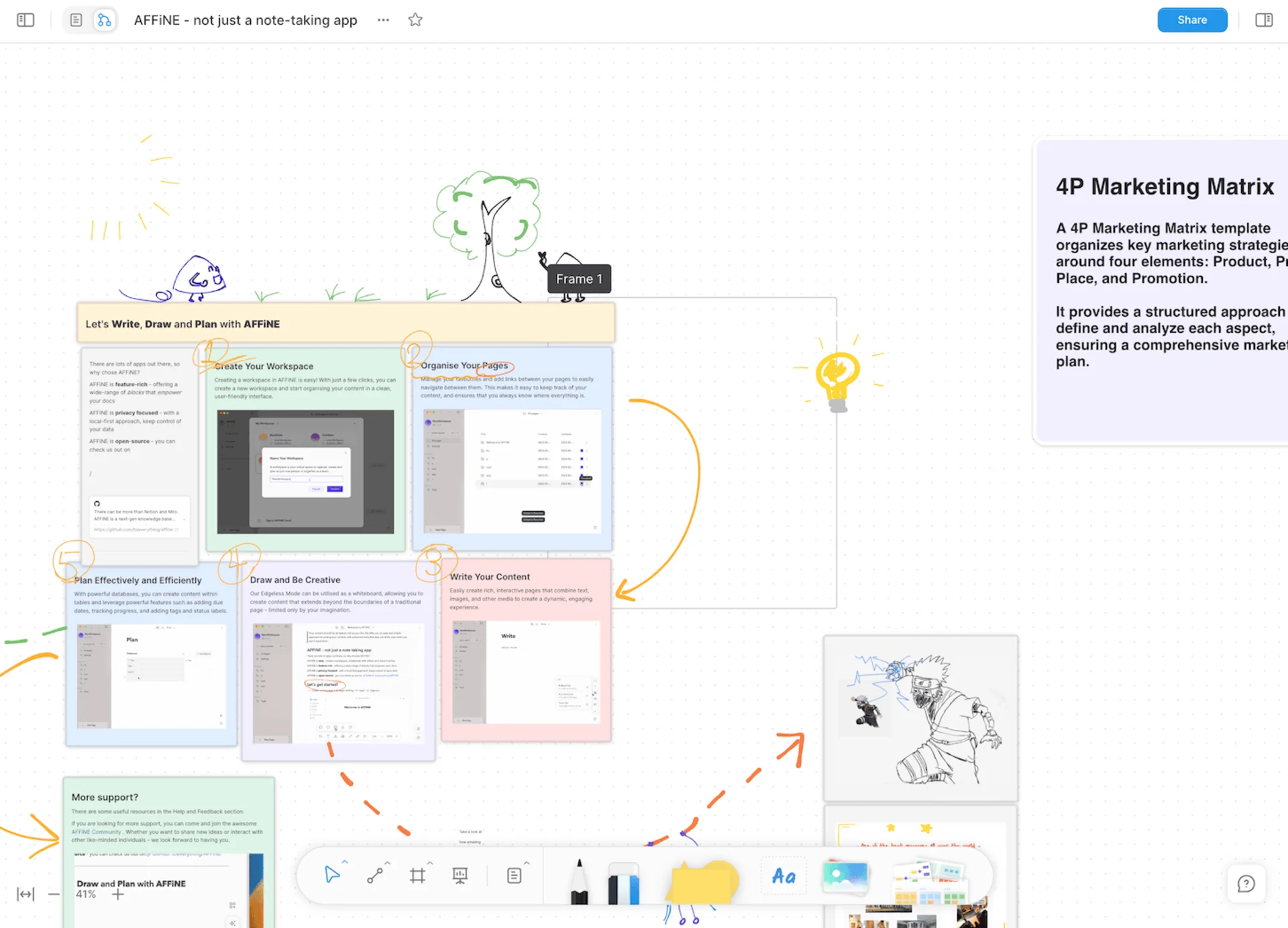
As a Notion alternative, AFFiNE Pro is early days. It offers some powerful features, like collaborative whiteboards, and changing between a document and a whiteboard is very smooth. Many people like that AFFiNE is also open-sourced and available offline, which makes it much smoother for visual thinkers who like to be offline. They are also invested in making more powerful AI abilities.
Pros:
- Has some light database abilities
- Amazing whiteboard to document abilities
- Comes with collaboration for team members
Cons:
- Lacks powerful databases
- Comes with a learning curve
6. Obsidian
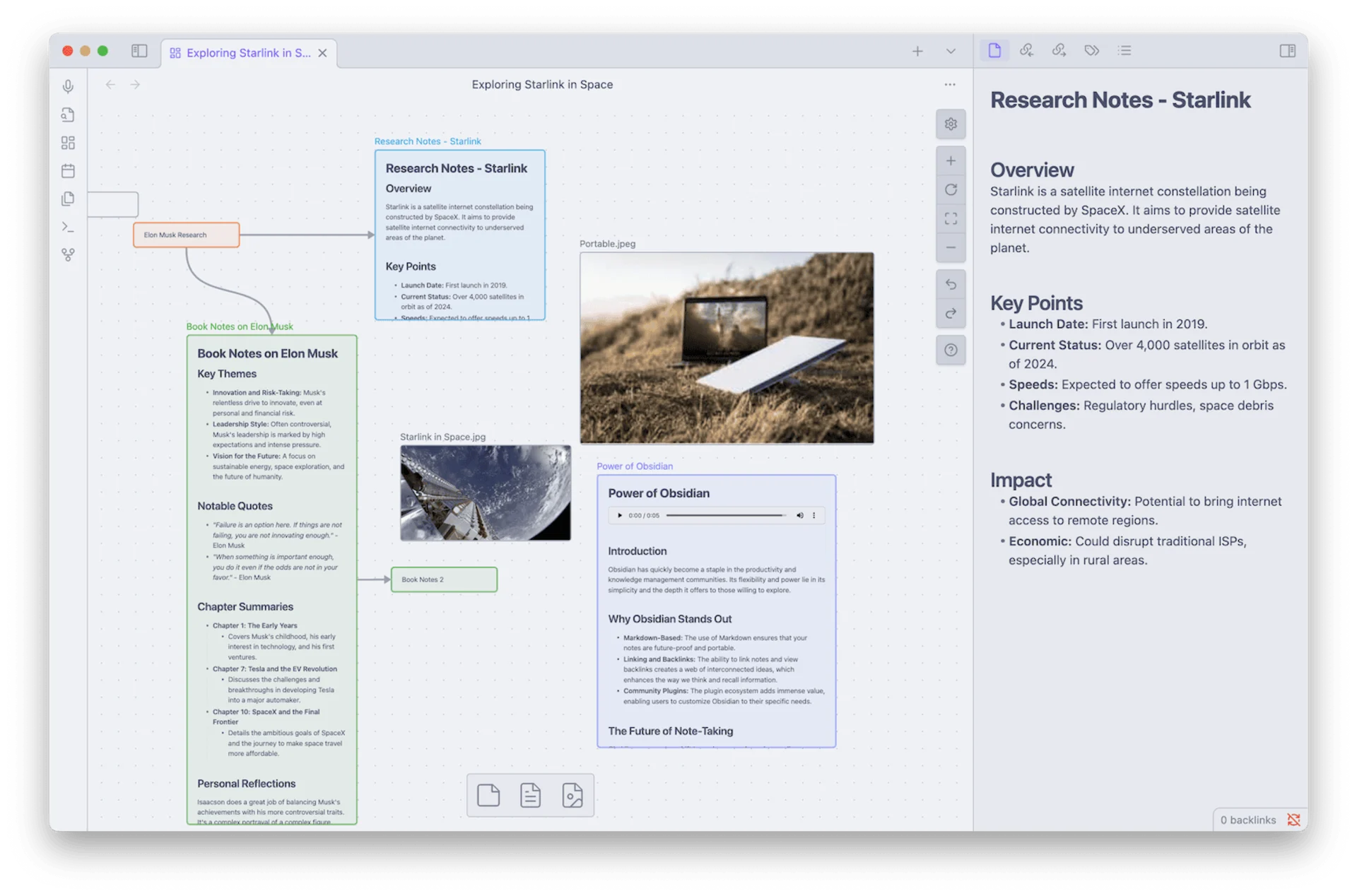
Obsidian works as a good Notion alternative for note-taking and advanced notes. Unlike Notion, Obsidian has a graph view and a way to connect notes more systematically. Focusing much more on notes and, in particular, doing an excellent job with PKM note-taking,
Obsidian is better for note-taking only but does come with some unique features. Everything is local-first and marked down with Obsidian, meaning notes are protected. The focus is on helping you take notes that you own. If you do want to sync, you can do that with iCloud sync securely or via Sync, the service they offer for an additional $4 per user per month.
Pros:
- Comes with PKM abilities
- Powerful graph view for networked notes
- Obsidian adds new features fairly regularly
- You can switch on and off features
- Free & easy access
Cons:
- Lacks project management
- Does not have database abilities
Pricing:
Obsidian is free to use with no limits; there is a $4 per month pricing for E2E notes & sync.
Is there anything better than Notion?
Many people ask, is there anything better than Notion? And that’s primarily because people are looking for something that is even more powerful. But Notion is probably one of the most powerful alternatives.
There are a few applications that can outperform Notion in terms of functionality. The closest in terms of integrations, automations, and customization is probably Coda, but it’s probably not suitable for individuals to use. Also, it’s more suitable for teams to use as a way to manage their workspace. It’s also now owned by Grammarly as well and has some powerful customization functions when it comes to managing documents.
Who competes with Notion?
Loads of applications compete with Notion, although it is tricky. There are main alternatives. For example, ClickUp is more a project management tool that wants to help you to host your all-in-one workspace in one app, but in a more traditional style.
Coda wants to provide more automations and comes with more of a document layout, as well as other alternatives like Nuclino, which also helps you to manage your knowledge. So, there are alternatives, but Notion probably provides the most all-around-natured one of all of them.
Is Coda or Notion better?
Coda is much more powerful in terms of the features with automations and integrations, in our opinion. There are more features. The pricing is slightly more, and the use cases are more enterprise-led, but collaboration is pretty similar between the applications. They are relatively similar.
Notion is much more approachable but does have a decent amount of automations and integrations that teams can use and get started, although we typically recommend Coda above Notion for teams.
Which one is better, Notion or xTiles?
Both of these applications are really good, but we’d probably say Notion is more of a customizable tool in terms of being able to build databases and having more AI features but does require more of a learning curve.
While xTiles actually is much more approachable, is more of a planner experience, and also allows you to get started much, much faster than the likes of Notion, many people find this more approachable. I would probably say that xTiles is better for individuals that are looking for more structure than Notion.
What are the best free alternatives to Notion?
Obsidian is probably the best all-around note-taking-focused alternative to Notion because it’s free, and there are really no limits to what you can do in terms of local storage, security, and things like that. People love to be able to connect up notes, and that’s a really attractive option inside of Obsidian.
But there are alternatives in terms of using it against Notion. For example, xTiles offers a really generous free plan for helping you to build your perfect setup. Anytype is also one that is offered for free and comes with some generous features. Obsidian and Anytype are probably good free alternatives if you’re looking for a private note-taking application. But if you’re looking for a like-for-like alternative to Notion that’s free, then Trello, xTiles, and Capacities are all good starting points.
Are there Notion alternatives for students?
Students want to be able to track all sorts of things, academia all the way to social planning, but the Notion offering for students is pretty good. There is xTiles, which is a good alternative, and Craft as well, which is a documents-based application that many people like. These are much more affordable and easy to use, even though Notion offers probably the best package for students in getting started.
What are Notion alternatives for personal use?
Most of the applications that we mentioned are good for personal use apart from apps like Coda, but there are some personal knowledge management apps like Obsidian and Capacities that could be used for individual use. But largely, most of the apps are good in terms of personal use every single day.
What are some good Notion alternatives that are open source?
AppFlowy and Anytype are both open source resources that allow you to see all of the privacy considerations as part of it, so it’s one to look at if you’re looking for open source Notion alternatives.
Oops, undefined is still in development...
Weekly Roundup: Explore People's Productivity Tools
Become a reader to our newsletter exploring what productivity apps people use on a daily basis to get things done